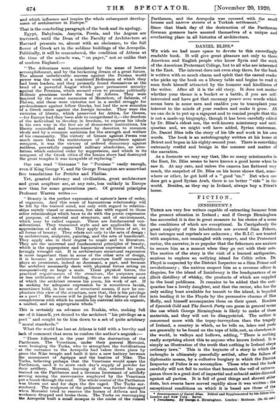DANIEL BLISS.*
WE wish we had more space to devote to this exceedingly readable book. It will give great pleasure not only to those American and English people who know Syria. and the work of the American Protestant College, but to all who are interested in the East. The interest does.not even stop there, for the book is written with so much charm and spirit that the casual reader who picks up the book on a library table and begins to read it soon finds himself attracted by the humour, and kindliness of the writer. After all it is the old story. It does not matter whether your theme is a bucket or a battle, if you are self. interested and have got that uncanny power over words which seems born in some men and enables you to transplant your interest to the minds of your readers and make it grow. All we can do is to put up a signpost and to remind people that this is not a made-up biography, though it has been carefully edited by Dr. Bliss's eldest son, the well-known missionary and anti- quarian and, we might well have added, Syrian statesman. Dr. Daniel Bliss tells the story of his life and work in his own words. The book is an autobiography written at his home at Beirut and begun in his eighty-second year. There is something extremely restful and benign in the manner and matter of the narration.
As a footnote we may say that, like so many missionaries is the East, Dr. Bliss seems to have known a good horse when he saw it. At any rate, and unless the camera has flattered very much, the snapshot of Dr. Bliss on his horse shows that, some- where or other, he got hold of a " good•'un." But when one does get a good Syrian Arab, there is no better " ride " in the world. Besides, as they say in Ireland, always buy a Priest's horse.


































 Previous page
Previous page